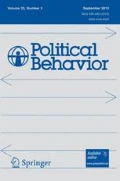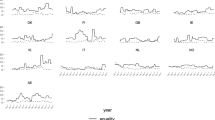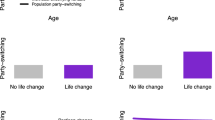Abstract
This article seeks to understand the development of partisanship among the largest of contemporary immigrant groups, Asian Americans and Latinos. Identifying the processes that underlie the acquisition of partisanship is often complicated because the associated concepts are not easily isolated from one another. In particular, among those born in the U.S., distinguishing between the separate effects of age and political exposure on partisan development is especially difficult since age usually serves as an exact measure of exposure to the political system and vice versa. Because immigrants' length of residence does not correspond directly to their age, tracking the acquisition of party identification represents one way to untangle the effects of age and exposure on partisanship. A strong relationship between the number of years an immigrant has lived in the U.S. and the acquisition of partisanship is found. Further analysis shows that naturalization, gains in English language skills, and media use also contribute to immigrants' acquisition of partisanship. This study reveals that a process of reinforcement through exposure to the political system underlies the development of political attitudes across diverse immigrant groups.
Similar content being viewed by others
REFERENCES
Abramson, Paul R. (1976). Generational change and the decline of party identification in America: 1952–1974. American Political Science Review 70: 469–478.
Acosta-Belen, Edna. (1988). From settlers to newcomers: the Hispanic legacy in the United States. In Edna Acosta-Belen and Barbara R. Sjostrom (eds.), The Hispanic Experience in the United States, pp. 81–106. New York: Praeger.
Arvizu, John R., and Chris Garcia, F. (1996). Latino voting participation: explaining and differentiating Latino voting turnout. Hispanic Journal of Behavioral Sciences 18: 104–128.
Beck, Paul Allen, and Jennings, M. Kent. (1991). Family traditions, political periods, and the development of partisan orientations. Journal of Politics 53: 742–763.
Berkowitz, Dan, and Pritchard, David. (1989). Political knowledge and communication resources. Journalism Quarterly 66: 697–701.
Black, Jerome H., Niemi, Richard G., and Powell Jr., G. Bingham. (1987). Age, resistance, and political learning in a new environment: the case of Canadian immigrants. Comparative Politics 20:73–84.
Bobo, Lawrence D., Oliver, Melvin L., Johnson Jr., James H., and Valenzuela, Abel (eds.). (2000). Prismatic Metropolis: Inequality in Los Angeles. New York: Russell Sage.
Cain, Bruce E. (1988). Asian electoral power: imminent or illusory? Election Politics 5: 27–30.
Cain, Bruce E., Kiewiet, D. Roderick, and Uhlaner, Carole J. (1991). The acquisition of partisanship by Latinos and Asian Americans. American Journal of Political Science 35: 390–422.
Campbell, Angus, Converse, Philip E., Miller, Warren E., and Stokes, Donald E. (1960). The American Voter. Chicago: University of Chicago Press.
Carlsson, Gosta, and Karlsson, Katarina. (1970). Age, cohorts and the generation of generations. American Sociological Review 35: 710–718.
Cassel, Carol. (1993). A test of Converse's theory of party support. Journal of Politics 55: 664–681.
Chaffee, Steven H., and Kanihan, Stacey Frank. (1997). Learning about politics from the mass media. Political Communication 14: 421–430.
Chaffee, Steven H., Nass, Clifford I., and Yang, Seung-Mock. (1990). The bridging role of television in immigrant political socialization. Human Communication Research 17: 266–288.
Chaffee, Steven H., and Tims, Albert R. (1982). News media use in adolescence: implications for political cognitions. In Michael Burgoon (ed.), Communication Yearbook 6: 736–758. Beverly Hills, CA: Sage.
Chaffee, Steven H., Zhao, Xinshu, and Leshner, Glenn. (1994). Political knowledge and the campaign media of 1992. Communication Research 21: 305–324.
Cho, Wendy K. Tam. (1999). Naturalization, socialization, participation: immigrants and (non-) voting. Journal of Politics 61: 1140–1155.
Claggett, William. (1980). The life cycle and generational models of the development of partisanship: a test based on the delayed enfranchisement of women. Social Science Quarterly 60: 643–650.
Claggett, William. (1981). Partisan acquisition versus partisan intensity: life-cycle, generation, and period effects 1952–1976. American Journal of Political Science 25: 193–214.
Converse, Philip E. (1969). Of time and partisan stability. Comparative Political Studies 2: 139–71.
Converse, Philip E. (1976). The Dynamics of Party Support: Cohort-Analyzing Party Identification. Beverly Hills, CA: Sage.
Conway, M. Margaret. (1991). Political Participation in the United States, 2nd ed. Washington, DC: Congressional Quarterly.
Conway, M. Margaret, Wyckoff, Mikel L., Feldbaum, Eleanor, and Ahern, David. (1981). The news media in children's political socialization. Public Opinion Quarterly 45: 164–178.
Cornwell, Elmer E. (1960). Party absorption of ethnic groups: the case of Providence, Rhode Island. Social Forces 38: 205–210.
Cornwell, Elmer E. (1964). Bosses, machines and ethnic groups. Annals 353: 27–39.
Dahl, Robert A. (1961). Who Governs? Democracy and Power in an American City. New Haven: Yale University Press.
Davis, Cary, Haub, Carl, and Willette, JoAnne L. (1988). U.S. Hispanics: changing the face of America. In Edna Acosta-Belen and Barbara R. Sjostrom (eds.), The Hispanic Experience in the United States: Contemporary Issues and Perspectives, pp. 3–56. New York: Praeger.
de la Garza, Rodolfo O., DeSipio, Louis, Garcia, F. Chris, Garcia, John, and Falcon, Angelo. (1992). Latino Voices: Mexican, Puerto Rican, and Cuban Perspectives on American Politics. Boulder, CO: Westview Press.
DeSipio, Louis. (1996). Making citizens or good citizens? Naturalization as a predictor of organizational and electoral behavior among Latino immigrants. Hispanic Journal of Behavioral Sciences 18: 194–213.
DeSipio, Louis. (1997). The new urban citizen: political participation and political attitudes of the newly naturalized. Manuscript prepared for presentation before the Social Science Research Council Committee on International Migration, Santa Fe, May 1997.
Erie, Steven P. (1988). Rainbow's End. Berkeley: University of California Press.
Gurwitt, Rob. (1990). Have Asian Americans arrived politically? Not quite. Governing November: 32–38.
Hero, Rodney E., and Campbell, Anne G. (1996). Understanding Latino political particiPARTY pation: exploring the evidence from the Latino national political survey. Hispanic Journal of Behavioral Sciences 18: 129–141.
Hing, Bill Ong. (1996). Reframing the immigration debate: an overview. In Bill Ong Hing and Ronald Lee (eds.), Reframing the Immigration Debate, pp. 1–34. Los Angeles: LEAP Asian Pacific American Public Policy Institute and UCLA Asian American Studies Center.
Jennings, James. (1988). The Puerto Rican community: its political background. In F. Chris Garcia (ed.), Latinos and the Political System, pp. 65–80. Notre Dame, IN: University of Notre Dame Press.
Jennings, M. Kent, and Langton, Kenneth P. (1969). Mothers versus fathers: the formation of political orientations among young Americans. Journal of Politics 31: 329–358.
Jennings, M. Kent, and Niemi, Richard G. (1984). Partisan orientations over the long haul: results from the three wave political socialization study. American Political Science Review 78: 1000–1018.
Johnson, James H., Farrell Jr., Walter C., and Toji, Dean S. (1997). Assessing the employment impacts of the Los Angeles civil unrest of 1992: Furthering racial divisions. Economic Development Quarterly 11: 225–235.
Johnson, James H. Jr., Oliver, Melvin L., and Bobo, Lawrence D. (1994). Understanding the contours of deepening urban inequality: theoretical underpinnings and research design of multi-city study. Urban Geography 15: 77–89.
Jones-Correa, Michael. (1998). Between Two Nations: The Political Predicament of Latinos in New York City. Ithaca: Cornell University Press.
Junn, Jane. (1999). Participation in a liberal democracy: the political assimilation of immigrants and ethnic minorities in the United States. The American Behavioral Scientist 42: 1417–1438.
Kam, Cindy D., and Ortiz, Anna Maria. (1998). Who's asking whom? Race, recruitment and political participation. Paper Presented at the 1998 Annual Meeting of the American Political Science Association, Boston, September 3–6.
Key, V. O. (1961). Public Opinion and American Democracy. New York: Alfred A. Knopf.
Kwoh, Stewart, and Hui, Mindy. (1993). Empowering our communities: political policy. In The State of Asian Pacific America: Policy Issues to the Year 2020, pp. 189–198. Los Angeles: LEAP Asian Pacific American Public Policy Institute and UCLA Asian American Studies Center.
Lee, Taeku. (2000). Racial attitudes and the color line(s) at the close of the twentieth century. In Paul M. Ong (ed.), The State of Asian Pacific America Transforming Race Relations, pp. 103–158. Los Angeles: LEAP Asian Pacific American Policy Institute and UCLA Asian American Studies Center.
Lien, Pei-te. (1994). Ethnicity and political participation: a comparison between Asian and Mexican Americans. Political Behavior 16: 237–264.
Lien, Pei-te. (1998). Who votes in multiracial America? An analysis of voting registration and turnout by race and ethnicity, 1990–1996. Paper presented at the 1998 Annual Meeting of the American Political Science Association, Boston, September 3–6.
Marshall, Adriana. (1987). New immigrants in New York's economy. In Nancy Foner (ed.), New Immigrants in New York, pp. 79–102. New York: Columbia University Press.
Martinelli, Kathleen A., and Chaffee, Steven H. (1995). Measuring new-voter learning via three channels of political information. Journalism and Mass Communication Quarterly 72: 18–32.
Moreno, Dario. (1997). The Cuban model: political empowerment in Miami. In F. Chris Garcia (ed.), Pursuing Power: Latinos and the Political System, pp. 208–226.Notre Dame, IN: University of Notre Dame Press.
Nakanishi, Don T. ( 1991). The next wwing vote? Asian Pacific Americans and California politics. In Byran O. Jackson and Michael B. Preston (eds), Racial and Ethnic Politics in California, pp. 25–54. Berkeley: IGS Press.
Nie, Norman, Verba, Sidney, and Kim, Jae-on. (1974). Political participation and the life cycle. Comparative Politics 6: 319–340.
Niemi, Richard G., and Jennings, M. Kent. (1991). Issues and inheritance in the formation of party identification. American Journal of Political Science 35: 4: 970–988.
Niemi, Richard G., Powell Jr., G. Bingham, Stanley, Harold W., and Evans, C. Lawrence. (1985).Testing the converse partisanship model with new electorates. Comparative Political Studies 18: 300–322.
Ong, Paul, and Nakanishi, Don T. (1996). Becoming citizens, becoming voters: the naturalization and political participation of Asian Pacific immigrants. In Bill Ong Hing and Ronald Lee (eds), Reframing the Immigration Debate, pp. 275–303. Los Angeles: LEAP Asian Pacific American Public Policy Institute and UCLA Asian American Studies Center.
Pachon, Harry. (1991). U.S. citizenship and Latino participation in California politics. In Byran O. Jackson and Michael B. Preston (eds), Racial and Ethnic Politics in California, pp. 71–88. Berkeley: IGS Press.
Patterson, Thomas E. (1980). The Mass Media Election: How Americans Choose Their President. New York: Praeger.
Portes, Alejandro (1996) (ed.). The New Second-Generation. New York: The Russell Sage Foundation.
Portes, Alejandro, and Rumbaut, Rube? G. (1996). Immigrant America: A Portrait, 2nd ed. Berkeley: University of California Press.
Rosenstone, Steven J., and Hansen, John M. (1993). Mobilization, Participation, and Democracy in America. New York: Macmillan.
Safa, Helen I. (1988). Migration and identity: a comparison of Puerto Rican and Cuban migrants in the United States. In Edna Acosta-Belen and Barbara R. Sjostrom (eds.), The Hispanic Experience in the United States: Contemporary Issues and Perspectives, pp. 137–150. New York: Praeger.
Saito, Leland. (1998). Race and Politics. Urbana, IL: University of Illinois Press.
Schmidley, Dianne, and Alvarado, Herman A. (1998). The Foreign-Born Population in the United States: March 1997 (Update), Current Population Report, P20–507.Washington, DC: U.S. Department of Commerce.
Shinagawa, Larry Hajime. (1996). The impact of immigration on the demography of Asian Pacific Americans. In Bill Ong Hing and Ronald Lee (eds.), Reframing the Immigration Debate, pp. 59–130. Los Angeles: LEAP Asian Pacific American Public Policy Institute and UCLA Asian American Studies Center.
Shively, W. Phillips. (1979). The relationship between age and party identification: a cohort analysis. Political Methodology 6: 437–446.
Tam, Wendy. (1995). Asians—a monolithic voting bloc? Political Behavior 17: 223–249.
Uhlaner, Carole, J. (1991). Perceived discrimination and prejudice and the coalition prospects of Blacks, Latinos, and Asian Americans. In Byran O. Jackson and Michael B. Preston (eds.), Racial and Ethnic Politics in California, pp. 339–396. Berkeley: IGS Press.
Uhlaner, Carole, J. (1996). Latinos and ethnic politics in California: participation and preference. In Aníbal Yañez-Chávez (ed.), Latino Politics in California. San Diego: Center for U.S.-Mexican Studies, University of California at San Diego, pp. 33–72.
Uhlaner, Carole, J., Cain, Bruce E., and Kiewiet, D. Roderick. (1989). Political participation of ethnic minorities in the 1980's. Political Behavior 11: 195–231.
Uhlaner, Carole, J., and Garcia, F. Chris. (1998). Foundations of Latino party identification: learning, ethnicity and demographic factors among Mexicans, Puerto Ricans, Cubans and Anglos in the United States. Center for the Study of Democracy, UC Irvine, Research Papers. Irvine: Center for the Study of Democracy, UC Irvine.
Valentino, Nicholas A., and Sears, David O. (1998). Event-driven political communication and the preadult socialization of partisanship. Political Behavior 20: 127–154.
Weaver, David, and Drew, Dan. (1995). Voter learning in the 1992 presidential elections: did the ‘nontraditional’ media and debates matter? Journalism and Mass Communication Quarterly 72: 7–17.
Wong, Janelle S. (1999). Political attitude formation and participation among Asian and Latino immigrants. Paper Presented at the Annual Meeting of the American Political Science Association, Atlanta, September 1999.
Wrinkle, Robert D., Stewart Jr., Joseph, Polinard, J. L., Meirer, Kenneth J., and Arvizu, John R. (1996). Ethnicity and nonelectoral political participation. Hispanic Journal of Behavioral Sciences 18: 142–143.
Author information
Authors and Affiliations
Rights and permissions
About this article
Cite this article
Wong, J.S. The Effects of Age and Political Exposure on the Development of Party Identification Among Asian American and Latino Immigrants in the United States. Political Behavior 22, 341–371 (2000). https://doi.org/10.1023/A:1010630130895
Issue Date:
DOI: https://doi.org/10.1023/A:1010630130895




